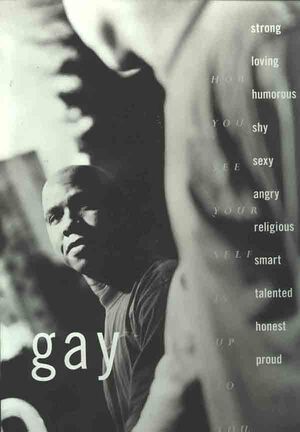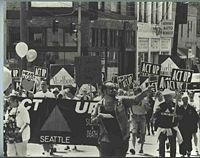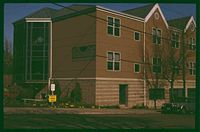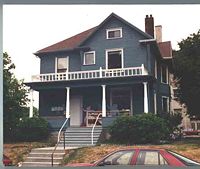Difference between revisions of "1980s-90s - Challenges and Triumphs"
The NWLGHMP (talk | contribs) |
m (Protected "1980s-90s - Challenges and Triumphs" [edit=sysop:move=sysop]) |
||
| (25 intermediate revisions by one other user not shown) | |||
| Line 1: | Line 1: | ||
'''1980s-90s - Challenges and Triumphs''' | '''1980s-90s - Challenges and Triumphs''' | ||
| − | The | + | [[Image:NWAFad.jpg|thumb|]] |
| + | <BR><BR>The 1980s brought one of the greatest challenges yet, locally and internationally: AIDS. In 1981, the first cases of Acquired Immune Deficiency Syndrome (AIDS) were reported in the New York Times. And, in 1982 the first AIDS case was reported in King County, Washington. The Seattle Gay Clinic sponsored a forum which gave rise to organizations such as the Northwest AIDS Foundation and the Chicken Soup Brigade. | ||
| − | |||
| − | Seattle’s early, diverse, and progressive response to the epidemic may have been the result of the coalitions, connections and clout built only half a decade earlier during the Initiative 13 battle. In the response to the AIDS epidemic, organizations like the Northwest AIDS Foundation pursued the more mainstream channels of the Citizens to Retain Fair Employment, while groups like ACT UP followed the more confrontational footsteps of | + | Seattle’s early, diverse, and progressive response to the epidemic may have been the result of the coalitions, connections and clout built only half a decade earlier during the Initiative 13 battle. In the response to the AIDS epidemic, organizations like the Northwest AIDS Foundation pursued the more mainstream channels of the Citizens to Retain Fair Employment, while groups like ACT UP followed the more confrontational footsteps of SCAT and Women Against Thirteen. |
| + | |||
| + | <BR> | ||
| + | [[Image:ACTUp protest.jpg|thumb|200px]] | ||
| + | <BR> | ||
| + | Seattle's chapter of ACT UP was founded in 1989, two years after The AIDS Coalition to Unleash Power (ACT UP) was founded by Larry Kramer in New York City. ACT UP's radical style ushered in a new era of direct action political activism in the gay and lesbian community. | ||
| + | |||
| + | <BR><BR><BR> | ||
| + | '''Building Community Resources''' | ||
| + | |||
| + | Seattle is home to many organizations that address specific needs in the GLBT community. | ||
| + | [[Image:BaileyBoushayHouse.jpg|thumb|200px]] | ||
| + | <BR> | ||
| + | [[Bailey-Boushay House]] is America's first skilled nursing facility that was planned, funded, built and staffed to meet the needs of people living with AIDS. In 1988, a group of concerned citizens formed AIDS Housing of Washington, which planned, funded and built the 34,000-square-foot facility that opened in 1992. | ||
| + | |||
| + | <BR><BR><br> | ||
| + | [[Image:LambertHouseSeattle.jpg|thumb|200px]] | ||
| + | Perhaps the most representative of the gains fought and won as the end of the century approached is Lambert House. The nation’s first drop-in center for lesbian, gay, bisexual and transgender youth, Lambert House opened with a youth dance on Pride Day, June 30, 1991. | ||
| + | |||
<BR><BR> | <BR><BR> | ||
| − | + | Many other organizations in the city serve the local, statewide, and national communites: The '''Ingersoll Gender Center''' offers support services for transgender men and women. '''Rainbow Families of Puget Sound''' provides a social network for GLBT families while '''Camp Ten Trees''' offers safe summer experiences for GLBT youth and children of queer families. '''Equal Rights Washington''' advances the cause of domestic partnership and same-sex marriage statewide. | |
| − | Seattle | + | |
| + | The '''Seattle Bisexual Women's Network''' and '''BiNet Seattle''' champion acceptance and provide social networks. Organizations like the '''People of Color Against AIDS Network (POCAAN)''', '''Entre Hermanos''', '''Seattle Black Pride''', and '''Trikone-Northwest: South Asian Queer Community''' formed to address specific ethnic and cultural concerns. The '''Pride Foundation''' oversees philanthropy directed at nurturing and sustaining a wide variety of regional initiatives. | ||
| + | |||
| + | <BR> | ||
| + | Early activists probably never anticipated such far-ranging results, but their efforts established a foundation for community organization that exerted a profound influence and generated a lasting legacy. | ||
| + | |||
| + | |||
| + | |||
| + | '''Off-Site Links:''' | ||
| + | <BR> | ||
| + | |||
| + | Lifelong AIDS Alliance (formerly Northwest AIDS Foundation) | ||
| + | [[http://www.lifelongaidsalliance.org/]] | ||
| + | |||
| + | Bailey-Boushay House | ||
| + | [[https://www.virginiamason.org/bbh/]] | ||
| + | |||
| + | Lambert House | ||
| + | [[http://www.lamberthouse.org/]] | ||
| + | |||
| + | Ingersoll Gender Center | ||
| + | [[http://www.ingersollcenter.org/]] | ||
| + | |||
| + | Rainbow Families of Puget Sound | ||
| + | [[http://www.rainbowfamiliesps.org/]] | ||
| + | |||
| + | Camp Ten Trees | ||
| + | [[http://www.camptentrees.org/]] | ||
| + | |||
| + | Equal Rights Washington | ||
| + | [[http://www.equalrightswashington.org/]] | ||
| + | |||
| + | Seattle Bisexual Women's Network | ||
| + | [[http://www.sbwn.net/]] | ||
| + | |||
| + | BiNet Seattle | ||
| + | [[http://www.binetseattle.org/]] | ||
| + | |||
| + | People of Color Against AIDS Network | ||
| + | [[http://www.pocaan.org/]] | ||
| + | |||
| + | Entre Hermanos | ||
| + | [[http://www.entrehermanos.org/]] | ||
| + | |||
| + | Seattle Black Pride | ||
| + | [[http://www.seattleblackpride.org]] | ||
| + | |||
| + | Trikone-Northwest | ||
| + | [[http://www.trikonenw.org/]] | ||
| + | |||
| + | Pride Foundation | ||
| + | [[http://www.pridefoundation.org/]] | ||
| − | + | <BR><BR><BR><BR><BR><BR> | |
| − | + | [[Seattle, WA: Queen City Comes Out: Exploring Seattle's Lesbian and Gay History]] | |
<BR><BR> | <BR><BR> | ||
| − | + | <small>''All content of this page copyrighted by NWLGHMP.''</small> <comments /> | |
Latest revision as of 11:04, 1 May 2010
1980s-90s - Challenges and Triumphs
The 1980s brought one of the greatest challenges yet, locally and internationally: AIDS. In 1981, the first cases of Acquired Immune Deficiency Syndrome (AIDS) were reported in the New York Times. And, in 1982 the first AIDS case was reported in King County, Washington. The Seattle Gay Clinic sponsored a forum which gave rise to organizations such as the Northwest AIDS Foundation and the Chicken Soup Brigade.
Seattle’s early, diverse, and progressive response to the epidemic may have been the result of the coalitions, connections and clout built only half a decade earlier during the Initiative 13 battle. In the response to the AIDS epidemic, organizations like the Northwest AIDS Foundation pursued the more mainstream channels of the Citizens to Retain Fair Employment, while groups like ACT UP followed the more confrontational footsteps of SCAT and Women Against Thirteen.
Seattle's chapter of ACT UP was founded in 1989, two years after The AIDS Coalition to Unleash Power (ACT UP) was founded by Larry Kramer in New York City. ACT UP's radical style ushered in a new era of direct action political activism in the gay and lesbian community.
Building Community Resources
Seattle is home to many organizations that address specific needs in the GLBT community.
Bailey-Boushay House is America's first skilled nursing facility that was planned, funded, built and staffed to meet the needs of people living with AIDS. In 1988, a group of concerned citizens formed AIDS Housing of Washington, which planned, funded and built the 34,000-square-foot facility that opened in 1992.
Perhaps the most representative of the gains fought and won as the end of the century approached is Lambert House. The nation’s first drop-in center for lesbian, gay, bisexual and transgender youth, Lambert House opened with a youth dance on Pride Day, June 30, 1991.
Many other organizations in the city serve the local, statewide, and national communites: The Ingersoll Gender Center offers support services for transgender men and women. Rainbow Families of Puget Sound provides a social network for GLBT families while Camp Ten Trees offers safe summer experiences for GLBT youth and children of queer families. Equal Rights Washington advances the cause of domestic partnership and same-sex marriage statewide.
The Seattle Bisexual Women's Network and BiNet Seattle champion acceptance and provide social networks. Organizations like the People of Color Against AIDS Network (POCAAN), Entre Hermanos, Seattle Black Pride, and Trikone-Northwest: South Asian Queer Community formed to address specific ethnic and cultural concerns. The Pride Foundation oversees philanthropy directed at nurturing and sustaining a wide variety of regional initiatives.
Early activists probably never anticipated such far-ranging results, but their efforts established a foundation for community organization that exerted a profound influence and generated a lasting legacy.
Off-Site Links:
Lifelong AIDS Alliance (formerly Northwest AIDS Foundation) [[1]]
Bailey-Boushay House [[2]]
Lambert House [[3]]
Ingersoll Gender Center [[4]]
Rainbow Families of Puget Sound [[5]]
Camp Ten Trees [[6]]
Equal Rights Washington [[7]]
Seattle Bisexual Women's Network [[8]]
BiNet Seattle [[9]]
People of Color Against AIDS Network [[10]]
Entre Hermanos [[11]]
Seattle Black Pride [[12]]
Trikone-Northwest [[13]]
Pride Foundation [[14]]
Seattle, WA: Queen City Comes Out: Exploring Seattle's Lesbian and Gay History
All content of this page copyrighted by NWLGHMP. <comments />



